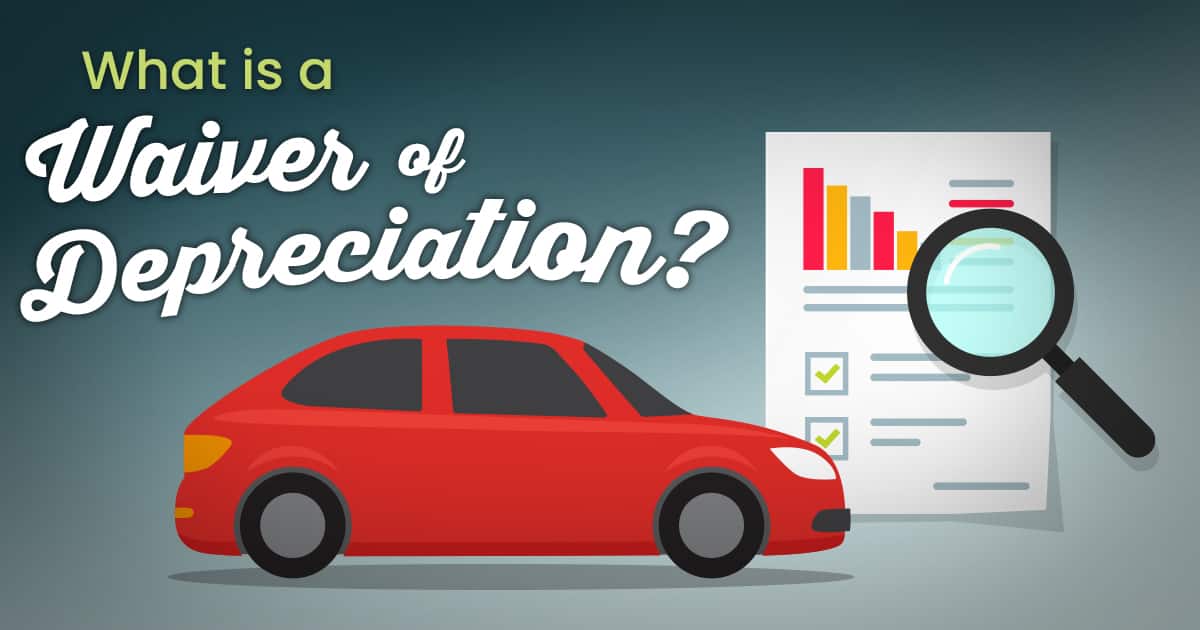
What is a Waiver of Depreciation?
February 9, 2023
Share:
If you have recently purchased a new car, you’re probably taking all necessary precautions to ensure that vehicle stays in tip-top shape. You’re parking far away from all the other vehicles and walking the extra few hundred steps to the grocery store to avoid any scrapes and bumps, you’re extra conscious of other drivers on the road – after all, that new car is your baby. You’d want to do anything in your power to protect it, right? The thought that it might be damaged or stolen is a whirlwind.
Statistically, the average driver will file an insurance claim for an auto collision once every 18 years. That’s not a lot, but that does mean that in a lifetime, you’ll likely be involved in three to four auto collisions. Your new car? It could be a part of that statistic.
If that new car does end up being involved in a motor vehicle accident and is written off, did you know that your insurance policy will only pay for your vehicle at its “actual cash value” at the time of loss? This works for older vehicles, but newer vehicles depreciate in value significantly over the first year or two of their lifetime. OPCF 43, or a waiver of depreciation, protects newer cars.
How does depreciation work?
Car depreciation is the amount of value that your vehicle decreases in over time. A new car is bound to depreciate, even if you aren’t making a habit of running over every bump or pothole that you see in the road. You could be as cautious as humanly possible and your new car would still depreciate. With current rates of depreciation, up to 20% of a new car’s value may be lost within 12 months of purchase. For the next four years of usage, 10% of its value per year will be lost. So, after five years, about 40% of its original purchase price will be its worth.
As a result, this is what you’d receive in an accident if your car was totally written off. That’s its actual cash value. But if you paid $30,000-$50,000 for that vehicle, and then it was written off – well, that wouldn’t exactly be enough to pay for another brand-new vehicle, right?
What is a waiver of depreciation?
A waiver of depreciation is a type of insurance endorsement that will alter how your insurance company views your new car’s value. There’s actually two types of depreciation waivers: OPCF 43, and OPCF 43A. The difference is this: OPCF 43 allows you to add this waiver to new vehicles, whether they’re financed or not, and OPCF 43A gives you the option to add to new leased vehicles. These waivers are available for all new vehicles, whether those vehicles are leased or financed. It removes your provider’s right to deduct depreciation value in the event of a total insured loss.
Upon adding OPCF 43 to your insurance policy, the insurance company is not allowed to deduct the depreciation of your vehicle for a set period of time. Typically, that period is 2-3 years, but it varies by insurance company. You can generally add this waiver to your policy upon the time of purchase or when you lease a new vehicle.
With OPCF 43 in force, your insurance provider will pay out the lowest option of the following:
- The actual purchase price
- The cost of replacing your current vehicle with a new one of the same make/model, or one that is similarly equipped
- The manufacturer’s suggested list price upon time of purchase
In order for OPCF 43 to be viable, you must be the owner of the original vehicle, the losses/damages must have occurred before the policy’s expiry date, and any replacing parts, tires, batteries, etc. for previous unrepaired damages would not be included.
You must also have the following to get an OPCF 43:
- Under 5,000 kms on the odometer
- You must have a bill of sale
- The vehicle must not have been previously owned
- The vehicle cannot be a “demo vehicle”
Is it worth getting OPCF 43?
It can be – depending on your insurance company. See, the OPCF 43 endorsement tends to differ between insurance companies. As soon as you begin driving your new vehicle, it will start to depreciate. If you are involved in an accident within 6 months of the time that you purchased it, you won’t even get enough money to pay back what you owe for the car.
OPCF 43, or a waiver of depreciation, may be purchased anywhere up to a full year after the vehicle has been purchased. There is, of course, restrictions, and this is assuming that the vehicle has had no damages done to it in the meantime.
If OPCF 43 is right for you, it’s a good idea to apply this endorsement before you even pick up the car from the dealership. You never know what might happen. Discuss with Excalibur’s Defenders about the potential of adding this endorsement to your vehicle; we can help give you the right advice for your situation, walk you through your savings options, and more!






